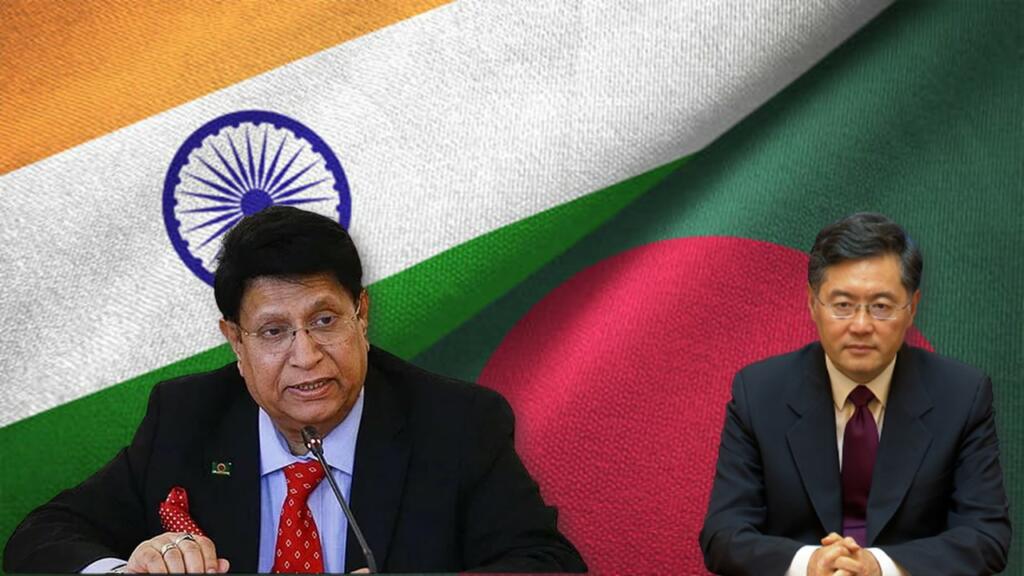When it comes to small and developing nations, China creates diplomatic relations on the basis of its “debt trap” policy. China offers the investments and, in return, tries to take territorial advantage. For many years, China enjoyed unquestionable authority over these indebted nations. But after India’s categorical objection to this new tool of colonisation, every nation has, more or less, started to challenge Chinese diplomacy.
A bad start to the office for Qin Gang
The Chinese foreign minister has an annual tradition of visiting Africa every year. The newly appointed foreign minister of China, on his way to the continent, halted at Dhaka. According to the reports, Chinese EAM Qin Gang made a surprise stop in Bangladesh and met Bangladesh’s foreign minister, Abul Kalam Abdul Momen.
Reportedly, Bangladesh’s minister questioned the Chinese counterpart about hollow promises made by Xi Jinping during his visit in 2016. Even after more than 7 years, the investment pledges made during previous visits have not materialized.
Momen also objected to the non-fulfillment of the previous agreement seeking removal of duties on Bangladeshi goods and the widening trade gap.
Also read: New Indo-Bangladesh defence deal to kick out China from Bay of Bengal
Bangladesh has faith in India, not China
While the Chinese projects are lagging behind, the Indian projects are going smoothly. The gas pipeline between India and Bangladesh is set to be inaugurated in February, with India investing the majority of the capital.
Analysing the investment pattern closely, one can find that the Chinese investment is actually an extortion tactic, while Indian investment is more like a helping hand that aims at upgrading the capabilities of any nation. That is why Indo-Bangladesh relations are strengthening and are some of the closest in the Indian subcontinent.
Interestingly, the surprise visit came a few days after India helped Bangladesh procure a nuclear shipment for the Roppar nuclear power plant through Haldia port. The shipment was imported from Russia, and thus, Bangladesh feared the imposition of sanctions if it took the shipment directly.
So, the increasing dominance of India at the global level and its strong ties with neighbouring countries are a cause for concern for China. China always looked for dominance in Asia before making a move at the global level. In its aspiration to become the Asian hegemon, the prime resistance comes from India. Along with strengthening ties with Japan and ASEAN nations, India also created a forum called BIMSTEC to counter Chinese aggression and establish prosperity in the Indian Ocean and Bay of Bengal.
Also read: Bangladesh hasn’t learned the China lesson from Nepal and Sri Lanka
The future of Indo-Bangladesh relations
Bangladesh has an independent foreign policy. As most of the nations, it works on their national interest. Being a developing country, it cannot grow in isolation and hence needs support. Bangladesh is cautious of the consequences of Chinese overdependence.
Analyzing the threat, Bangladesh seems to be more vigilant. On the other hand, India’s foreign policy has a profound impact on the world and is still unquestioned on moral grounds. Hence, it is pretty much clear that India will be the leading force in Asia in general and the Indian subcontinent in particular.
Since every nation seeks development without oppression, there is a need for reliable partnerships. Bangladesh knows that keeping good relations with countries like India will be fruitful for the nation. And with India’s growing influence, it will only benefit. The treatment of the Chinese foreign minister is just a start, and with India’s support behind it, Bangladesh will sooner or later say “goodbye” to China.
Support TFI:
Support us to strengthen the ‘Right’ ideology of cultural nationalism by purchasing the best quality garments from TFI-STORE.COM
